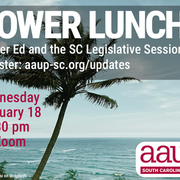Fall 2019 Conference Minutes
- Jul 1, 2020
- 6 min read
The minutes below are posted but not yet approved. These minutes will be updated after vote for approval on July 1, 2020. Please send all requests for changes to aaupofsc@gmail.com
AAUP – SC 2019 Fall Meeting
University of South Carolina
Columbia, SC
September 21, 2019
SC-AAUP President Mark Blackwell, called the meeting to order at 10 am.
U of SC Columbia AAUP Chapter President welcomes attendees, notes the history of the AAUP at U of SC, and introduces keynote speaker Interim Provost Tayloe Harding.
Interim Provost Harding welcomed attendees and noted the importance of rebuilding shared governance at U of SC following the controversial hiring of new President Caslen.
Blackwell adjourned the meeting for five minutes to allow the keynote speaker to exit.
Blackwell asked new members from the new U of SC chapter to introduce themselves. He noted that the U of SC School of Medicine Greenville has recently started a new AAUP chapter.
Representative from Clemson presented concerns about a merit pay system displacing cost of living adjustments to faculty salaries at Clemson. According to Representative from Clemson, the system was permitted by the state legislature at the urging of Clemson University lobbyists. Faculty, without being informed that merit pay would displace cost of living adjustments, were asked to devise a seven-point rating system that would be used to identify those eligible for merit raises. Afterwards, cost of living adjustment funds were used to pay for merit raises though the rubrics designed by faculty were inconsistently applied. The Provost, Robert H Jones, met with concerned faculty and explained the plan would result in a “less egalitarian and less union-like” pay structure.
Attendees raised questions about the language of the bill authorizing the substitution of merit-raises funded by money allocated for cost of living adjustments to salaries. There was discussion over whether it was standard practice for faculty to receive annual contracts reporting their expected salary. Attendees pointed out that the plan would lead to compression and inversion. Representative from U of SC noted that U of SC is currently deciding how to use new monies. Attendees worried that, following Clemson’s lead, other institutions might replace cost of living adjustments with merit raises. Blackwell proposed creating a working group to focus on the issue, examining a variety of schools to see if similar policies were being proposed or adopted.
David Bruzina described last year’s SC Equity Week initiative and this year’s plans to produce a press release and distribute an information sheet describing contingent faculty conditions and Equity Week plans at participating campuses. He asked for chapter contact information, so he can request information from participating chapters.
Bruzina reported on the AAUP Summer Institute and noted funding is available to support attendance.
Blackwell and Amanda Warren described changes in the national AAUP structure, including the merging of the CBC and Advocacy entities, the shift to reduced and biannual national meetings, and the revised representation structure. They noted the importance on finding out the details of the new rules and making sure the SC conference was in compliance.
A question was asked about the National AAUP’s continuing role in responding to the hiring of new President of U of SC Caslen. Discussion focused on reforming the U of SC Board of Trustees.
Blackwell noted that the U of SC faculty senate would have to pass a vote of no confidence in the U of SC Board of Trustees, after which the U of SC AAUP chapter and the SC-AAUP could ask National to investigate and possibly sanction the institution. Attendees discussed this course of action, possible responses by the accrediting body SACS, and the Board of Trustees susceptibility to shaming. U of SC AAUP representatives noted the situation is delicate: the board’s actions demand a response but sanctioning and accreditation problems would affect faculty and students. Attendees noted that passing a vote of no confidence and asking for an investigation would apply pressure to the board and could affect useful changes without U of SC being in the end sanctioned. Blackwell emphasized that the problem to be targeted is not the new president but the process by which he was selected. He also noted the high stakes involved in the faculty’s response to the Board of Trustee’s actions.
The meeting adjourned for lunch at 12:15.
The meeting resumed at 2:15.
Blackwell asked for chapter reports.
Representative from Clemson reported that Clemson’s chapter was in disarray and asked for help establishing the chapter’s membership. Blackwell and Warren offered assistance. Representative from Clemson reported that Clemson faculty are confronting a number of problems including the merit-pay issue, faculty manual violations, and problematic administrator and faculty searches.
Representative from U of SC Upstate reported that U of SC Upstate is confronting similar problems. Their chapter is in disarray; contingent faculty have formed their own group; and the administration is monitoring faculty groups on campus and ignoring requests that faculty be allowed to send emails to all faculty on campus.
Representative from Coastal Carolina reported that the Coastal Carolina chapter is focused on the ongoing search for a new President of the institution. The chapter is requesting that an AAUP representative serve on the search committee. They anticipate their request will be denied.
Representative from U of SC reported that the new U of SC Columbia chapter is up to 58 members. He names the new chapter’s officers.
Blackwell, reporting for Brandon Inabinet at Furman University, asked that Furman host the SC-AAUP chapter in the Spring. This motion is passed.
Representative from Francis Marion described the Francis Marion chapter’s involvement in new faculty orientation.
There is some discussion of how AAUP dues are paid—by paycheck withdrawals or through one-time payments.
David Bruzina reported that the U of SC Aiken chapter, though small, is remaining active. He noted that in the last meeting the membership unanimously voted to urge to U of SC Columbia chapter to pass a vote of no confidence in the U of SC Board of Trustees.
Representative from U of SC told him to write U of SC Faculty Senate President Mark Cooper.
The minutes from the Spring conference meeting were approved.
Shawn Smolen-Morton reported that he has brought order to the SC-AAUP finances and that we have $7,000 on hand and have disbursed $1,780 for the summer trip to the national meeting in DC.
Blackwell urged members to apply for funding and to use the opportunity to build AAUP advocacy in SC.
Warren noted that members can reach her for help with communications and asked for guest posts on the SC-AAUP webpage.
One attendee noted that information about SC-AAUP and SC chapters on the National website is out of date.
Blackwell summarized recent AAUP issues including involvement at U of SC Upstate when in 2015 the faculty passed a vote of no confidence in the previous President, concerns about merit-raises and cost of living adjustments at Clemson, the Dan Turner case at Coastal Carolina University as well as an ongoing search for a New President, and the U of SC Board of Trustee’s controversial hiring of Caslen.
Attendees voiced concerns about how faculty should respond to Caslen’s hiring, noting that a faculty response would be met with a professional PR campaign. Attendees suggested proceeding carefully and coordinating any action with legislators and the press.
Blackwell noted the President of Coker College had recently resigned and promised to contact the interim President when one was appointed. Laurence noted that the term of Clemson University’s President ends in 2020.
Blackwell asks for new business items.
A motion for Furman University to host the Spring 2020 conference was passed unanimously.
A motion for the Fall 2020 conference to be held at Francis Marion University was passed unanimously.
A motion to award FMU President Fred Carter an inaugural AAUP administrator prize was passed unanimously.
A motion to form a committee to examine cost of living and merit-raise issues was passed unanimously. A representative from Clemson and from U of SC Aiken were elected and will serve on the committee with Blackwell serving as ex officio member.
A motion to form a committee to examine presidential searches and establish a framework for monitoring future searches was passed unanimously. Blackwell and a representative from U of SC Upstate will serve on the committee. The representative from U of SC Upstate noted that she was troubled by the tokenism presented by the U of SC President search.
Blackwell noted that the SC-AAUP conference could address the U of SC faculty senate directly through a video conference, and could address other faculty chairs across SC.
Meeting adjourned at 3:15.





















